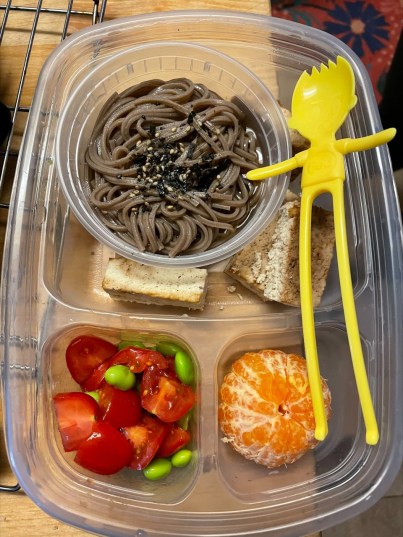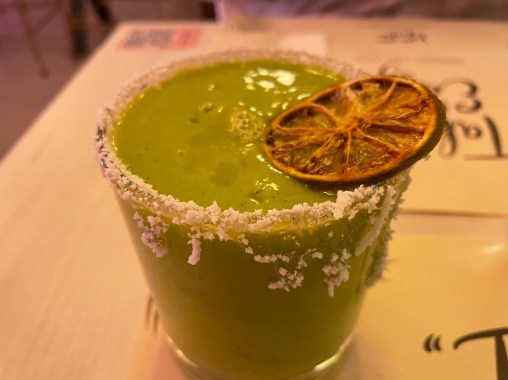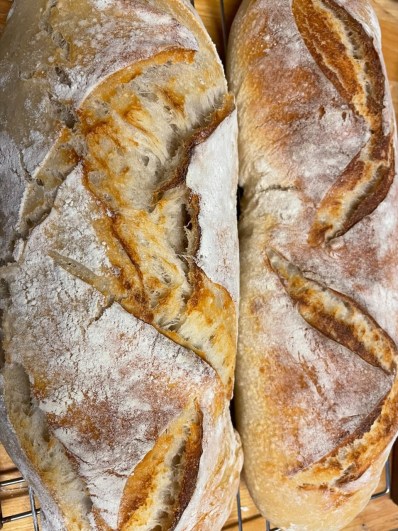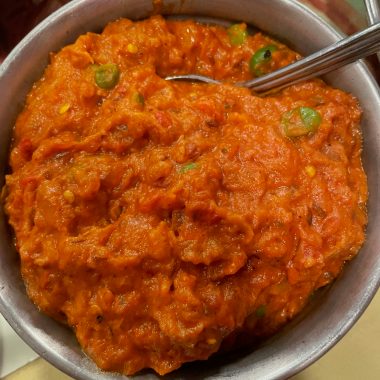When I first started my blog, I had the intention of interviewing and collaborating with vegetarian and vegan creatives, cooks, activists, and academics. Unfortunately, that fell by the wayside.
However, I discovered Dr. Ian Werkheiser through his engaging podcast Thought about Food and discovered a fellow philosopher who is also committed to ethical eating. This commitment is illustrated through his dynamic scholarship, innovative teaching, and principled activism.
Recently, I had the wonderful opportunity to participate in an episode of his thought-provoking podcast and after our scintillating conversation, I decided that he would be an awesome person to interview for my blog!
Dr. Werkheiser is a philosophy professor, podcaster, a vegan of 15 years, and an activist (just to name a few cool things he’s doing). Read below for his intriguing ideas on the future of veganism, why the term “plant-based” is squishy, along with his delicious veganized family scone recipe!
Tell me a little bit about yourself, your philosophical work, activism, and interests.
I’m an Associate Professor in the Department of Philosophy at the University of Texas Rio Grande Valley. I work on a lot of issues, including philosophy of food, philosophy of animals, environmental philosophy, philosophy of knowledge (epistemology), and philosophy of technology, always with a strong justice component.
I’ve been involved in a number of different activist projects over the years, including things like the fight for Proposition 2 in California, food justice and environmental justice issues when I was a grad student in Michigan, and now borderland issues down here in Texas.
I also have a podcast, Thought About Food, which interviews people about various issues in food and food studies.
I love to cook, bake, and even brew beer when I have the time. I’m also a dad, and have spent the last year helping my kids with remote elementary school while also teaching my classes, so there unfortunately hasn’t been much time for other interests.

What led you to veganism?
My road to being vegan was a long one. When I was nine years old my babysitter had a copy of a PETA magazine out on her coffee table which I read. I have some problems with that organization now, but at the time I was shocked to see pictures of a chicken slaughter operation. I decided right then that I was going to be vegetarian and not eat animals anymore (my babysitter is a good example of how we can be effective advocates in our own lives and reach out to others by the way).
My mom was pretty mad at the babysitter, and absolutely refused to make me special vegetarian food. Partly that was because as a single mom she didn’t want to make a different meal for me than her three other kids (which is understandable).
But another reason that might be worth teasing out is that she was very much in what Bob and Jenna Torres have called “The cult of protein,” in that she believed a) you need a lot of protein at every meal both to grow and to have energy, and b) “protein” is a magic substance found only in animals. Basically for many people in the US it’s a stand-in for older ideas of an Élan Vital, a “life force” that lets animals move and which we need to replenish by eating other moving animals.
Anyway, I held out for about six months eating just a bun with lettuce, tomato, and cheese when my mom made burgers, just pasta when she made spaghetti with meat sauce, etc. Six months is a long time when you’re only nine! After that I gave up, but as soon as I lived on my own I became mostly vegetarian but sometimes eating fish.

When I started dating the person I would eventually marry, she was mostly vegetarian but would occasionally eat chicken. It was easy enough for both of us to cut those out of our diet since the other person didn’t eat them, and after being together a few years we decided that since we were vegetarian for ethical reasons, veganism was more coherent with our values. As of now I’ve been vegan for about 15 years, and both my kids are vegan as well.

Coming back to my mother for a minute, while me being vegetarian in college wasn’t too big a deal for her (I was already as tall as I was going to get so she wasn’t as concerned about “protein,” and she didn’t have to cook for me, so she mostly rolled her eyes and assumed I’d “get over it”), she was quite upset when I told her I was going to be vegan.
The reason is that I was essentially telling her that all the baking she wanted to do–for example, there’s a family Irish scone recipe that was passed down for many generations and is very important to my family–to show her love was being rejected by me. Even more importantly, both I and my fiancé at the time were doing this, raising the specter that she might never be able to show her love in that way to future grandkids. She’s since come around, and a big part of that was me veganizing those recipes, especially the family recipe for Irish scones.
That’s why veganizing family recipes like the scones I made is so important both for me and for the rest of my family. It shows that things that are important in one’s heritage are getting carried forward, but they’re also picking up this generation’s values and understanding.
What is veganism to you? How does your situatedness (e.g. class, gender, race, etc.) impact your relationship with food and veganism?
For me, veganism is a moral stance, and one focused specifically on not participating in harm to our fellow animals. There are certainly other arguments one could make along environmental lines or reducing hunger or freshwater usage in the world, but that isn’t what motivates me. It also has a lot to do with the act of eating.
Certainly lots of things we do are implicated in harm to others, including non-human animals, but I think that there is something special about taking food into our body — literally incorporating it — that makes moral issues more phenomenally salient. For most of us, including people who think they don’t care about these sorts of questions, there are strong taboo rules about technically digestible foods we won’t eat (bugs for many of us).

Because it’s a moral value, of course there are times when it might come into conflict with other moral values we might have. I’m lucky enough to be situated in a way that makes eating only vegan food possible, but there are certainly people for whom it’s much more difficult.
I come from ethnic backgrounds (Irish and German) where meat and other animal products are very central, and one serious moral value is continuing family traditions, at least for many people. That’s why veganizing family recipes like the scones I made is so important both for me and for the rest of my family. It shows that things that are important in one’s heritage are getting carried forward, but they’re also picking up this generation’s values and understanding. This is very similar to Robert Figueroa’s work on environmental heritage by the way, which I’ve always found quite interesting.
Do you prefer the term “veganism”, “plant-based eating”, or something else entirely?
I prefer the term vegan/veganism. I think “plant-based” is dangerously ambiguous and squishy. I understand the argument that it might be more appealing to people who find the word “vegan” to be off-putting, but as a vegan, if I see that a product is plant-based I know that I still need to check the ingredients list, because that isn’t a guarantee.
Legally speaking, there are some strong laws about false labels, so if food isn’t vegan but it says “vegan” somewhere on the packaging, companies are open to legal prosecution and correction. “Plant-based,” though, isn’t defined and so anyone can call put it on the label for their product. In this way, it’s like the term “local.” Organic, fair-trade, union-made, etc. are terms with strict legal definition, but “local” isn’t, so companies like putting it on their product. (I co-authored a paper on that topic a few years back, called “From Food Justice to a Tool of the Status Quo: Three Sub-movements Within Local Food” if you’d like to learn more about this.)

More broadly, I think that constantly running away from a term that has some negative connotations (like veganism arguably does, in that some people see it as too white, middle-class, consumerist, etc.) is a losing strategy because it makes it more difficult for people who support something to find each other and talk to each other, and opponents will quickly associate the new term with the same negative meanings.
Better I think is to argue that the idea behind the term is good and defend or reclaim it. That said, I’m fine with people calling things whatever they want; as a philosopher I just get a little itchy around ambiguity being introduced through terminology.
Do you enjoy cooking? If so, what are your favorite vegan dishes to make? If not, what are your favorite vegan dishes to eat?
I love to cook, and make pretty involved meals most days, especially during the pandemic. My favorites are baking (or bringing baking and cooking together as I do when I make sourdough pizza from scratch for our weekly pizza-and-a-movie Saturdays as a family), and trying new foods. I really enjoy learning about the history around a dish and then trying it out to make that story more vivid by bringing in different senses.

Since I’ve been talking about veganizing the family Irish scone recipe, let me throw that in here:
Ian’s Veganized Family Irish Scone Recipe!
Dry Ingredients

- 4 cups flour
- 1 cup sugar
- 2 rounded tsp baking powder
- 1/4 tsp salt
- 1/2 cup raisins
Wet Ingredients
- 2 Tbsp ground flax seeds and 5 Tbsp water
- 1 stick vegan butter cut into chunks
- 1 cup non-dairy milk
- 1 tsp apple cider vinegar
Directions
- Preheat the oven to 400 degrees.
- Pour the milk into a 2-4 cup size Pyrex measuring cup. Add the butter to the milk and microwave on high just until the butter melts (don’t overheat it).
- Add the vinegar and set it aside to cool and break.
- Vigorously mix or blend the ground flax seeds and water and add that to the milk.
- In another bowl, combine all the dry ingredients and mix thoroughly, being sure to get the raisins separated from each other.
- Pour the wet ingredients over dry and stir with a wooden spoon. Turn the batter out onto a floured board and sprinkle a bit more flour on top.
- Knead briefly to get it to form a ball (but don’t develop the gluten through a hard knead), then flatten it out to about 1/2 inch thick. Cut it into 8 wedges (like a pie).
- Lay them out, nearly touching, onto a baking sheet. Bake at 400 degrees for 20-25 minutes until golden brown (they should look like the picture I included).
How has it been for you to be a vegan in the Edinburg, Texas area?
The Rio Grande Valley is not a great place to be vegan in terms of restaurants or easy access to specialty ingredients. While some Mexican food is very vegan-friendly, or at least you can avoid the meat, the part of Mexico we border, and which has strongly influenced our brand of Tex-Mex food, is very meat-centric. Worse, it’s a cuisine where animal products are snuck in everywhere (an ox tail in the beans, some beef broth in the rice, etc.).
That said, as I mentioned above it’s getting easier everywhere in the US, and there’s a pretty robust community of vegans in the Valley who help each other by sharing information or by starting small craft businesses making a few vegan items (check out the Facebook group RGVvegans for examples of that, and frequent interesting conversations about being vegan in this borderlands culture).

What advice do you have for people transitioning to veganism or plant-based eating in general?
I’d advise a few things:
First, use it as an opportunity to grow and learn. Learn new recipes, try new restaurants, meet new people, learn about how our food system works, and learn about how this issue is connected to a lot of other issues of injustice. Approaching it with an attitude of expansion and growth, rather than focusing on losing things or cutting things out, is a lot more pleasant, more motivating, and can help get you more involved in meaningful activism.
Second, it will get a lot easier. For most people, that “taboo” thing I was talking about earlier kicks in and you no longer miss most ingredients you’ve given up.
Third, I’d say let the transition happen naturally. By that I mean don’t feel like you need to go through your whole house and throw away everything that has animal products, because that’s expensive and daunting. Instead, just replace non-vegan items with vegan ones when things run out as you’d have to do anyway.
Fourth, if you find people giving you a hard time, there’s been research that using the word “can’t” rather than “don’t” makes people oppose you a lot less in social situations (so if you say “I can’t eat eggs” people will try to accommodate you, but if you say “I don’t eat eggs” people will try to get you taste them).
That said, you might want to sometimes have the more difficult conversations. Carol J. Adams talks about standing in as the absent referent of the dead animal that “pork” refers to–making it impossible for people to pretend that what they’re choosing doesn’t have a moral valence. Pick those times wisely or risk being exhausted, and do it in a friendly, open way, but it’s something to consider.
I think “plant-based” is dangerously ambiguous and squishy.

How has the pandemic impacted your relationship with food and veganism? How do you see the pandemic impacting the future of food?
I’m actually working on a paper on this topic. Here’s the abstract:
The pandemic has been a disaster for the global food system. Many more people are food insecure; disruptions have at times left food in the field and empty shelves; “essential” workers in the food system have been subjected to infection risk; restaurants and other community food centers are closed, perhaps permanently.
Yet these disasters have had one positive outcome: people are more aware of the food systems on which they depend, and some of the injustices that are present in non-pandemic times.
One of the most stubborn problems facing any attempt to address injustices in the dominant food system is that system’s opacity. Everything from advertisements and marketing, to the globally distant network of food distribution, to laws explicitly banning whistleblowing, work to create an epistemic deficit among people enmeshed in the system. This can lead to apathy, or to mistakenly directed efforts to reform the industrial food system.
In this paper, I examine this epistemic deficit, its causes and consequences, and the opportunities in the disruption of a system to reduce the epistemic deficit of participants in that system around injustice. This is not an inevitable result, and so the paper also discusses what actions make this outcome more or less likely. No one would wish for the (still not yet finished) events of the pandemic, but I argue that it is at least possible that we could come out of it with the resources to make our food systems better.

Vegans should be committed to eliminating suffering in the food system, and a lot of that suffering falls on human farm laborers, slaughterhouse workers, underpaid and harassed restaurant employees, and so on. Linking up with those kinds of causes is more morally consistent, and builds solidarity and alliances to address all these issues.

Where do you see the future of veganism?
There are many possibilities of where things might go of course, but I certainly see some trends that I think we can be confident will continue for at least a while.
- One of these is that there are increasing options for vegans at grocery stores, restaurants, and so on. Vegan products pretty clearly have a committed niche of well-informed buyers in the market who will seek out vegan products and tell each other about them, and because for many people it’s a moral issue, they’re able to pull other people with them so the market is responding and I expect that will become even more prevalent over time.
- Another trend is the development of increasingly “realistic” vegan options of animal products. Depending on how you categorize them, this may or may not include literal meat, eggs, milk, etc. grown in a lab. I have some mixed feelings about those, but I think it’s pretty likely they’ll become more common moving forward.

So those are some trends I see in issues of concerns to vegans. For the movement itself, I hope that it can expand and strengthen itself by linking with other justice movements, particularly those affecting humans who work at various points in the food system, and getting a stronger awareness of class, race, and gender issues. I think this is important for a few reasons:
- Vegans should be committed to eliminating suffering in the food system, and a lot of that suffering falls on human farm laborers, slaughterhouse workers, underpaid and harassed restaurant employees, and so on.
- Linking up with those kinds of causes is more morally consistent, and builds solidarity and alliances to address all these issues. It can also be a way to show that the current dominant industrial animal-based food system is harmful in ways that many people haven’t thought of.
- Connecting to class, race, and gender issues also helps dispel the stereotype of vegans as wealthy people with nothing better to do, and will help the movement avoid accidentally reproducing or increasing injustices by having too narrow a focus. Let’s hope!
You can follow Dr. Ian Werkheiser on Twitter, check out his scintillating podcast, Thought about Food, and learn more about him on his website. You can also email him.



Recent Comments